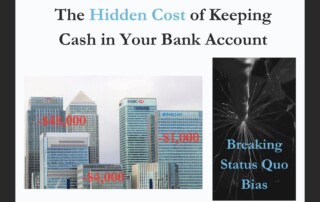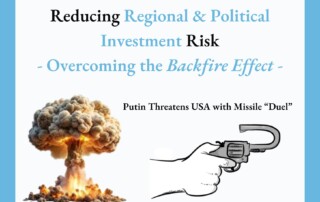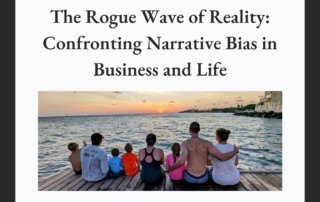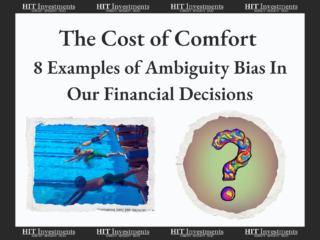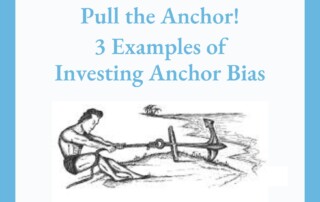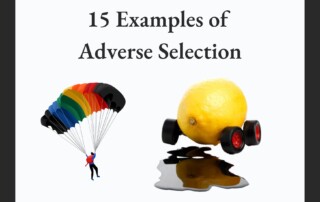Behavioral Finance and Economics
The Hidden Cost of Keeping Cash In Your Bank Account – Breaking Status Quo Bias
Why settle for 0.01% on your savings when you can do better? At today’s rates of 4%, $50,000 would earn an additional $2,000 per year. Recently, I advised three of my financial wellness clients and two friends to move their idle cash into an interest-earning account. Their potential gains were significant, up to $48,000 more per year! It seemed like a no-brainer, who wouldn’t want “free” money? Plus, I knew these extra earnings would help accelerate their financial goals that we had previously discussed. Yet, only three out of the five made the change. Why? Status quo bias? [...]
Reducing Regional and Political Risk in Your Investments: Overcoming the Backfire Effect
Reducing Regional and Political Risk in Your Investments: Overcoming the Backfire Effect When it comes to investment decisions, our brains often cling tightly to existing beliefs, even when faced with conflicting evidence. For example, my daughter’s basketball team lost 18-0 last night, no joke, they didn’t score a single point 😯! But when I think about their team this morning, I still cling to my belief that they are great, a team capable of winning the league. This behavioral phenomenon is known as the backfire effect, it causes us to double down on familiar but flawed ideas rather than reevaluate [...]
The Rogue Wave of Reality: Confronting Narrative Bias in Business and Life
Imagine sitting on the edge of a dock gazing across a dark blue ocean. Each wave crashing at your feet represents a moment in your life, fleeting and irreplaceable. Time, like each wave, is both abundant and finite. It's a resource we often take for granted, yet it's the most precious one we possess. Every second that ticks by is a moment we don’t get back, an opportunity to make a choice, take action, or savor. How we choose to spend our time defines the very essence of our lives. This past spring I focused on my own time just [...]
The Cost of Comfort – 8 Examples of Ambiguity Bias In Our Financial Decisions
The Cost of Comfort - 8 Examples of Ambiguity Bias In Our Financial Decisions Ambiguity bias is our natural inclination to prefer the familiar option over the unknown, even when the latter may offer equal or better outcomes. The Ellsberg Paradox: Balls and Urns This cognitive bias was first highlighted by Daniel Ellsberg in 1961 through his thought experiment involving two urns: one with a known 50/50 mix of red and black balls, and another with an unknown mix of red and black balls. The folks in Ellsberg's study consistently chose to bet on the urn with the known [...]
Pull Anchor: How Anchoring Bias Can Sink or Save Your Investment Portfolio
As a dedicated saver turned professional investor, I’ve come to recognize the importance of making rational, data-driven investment decisions. In this pursuit, understanding cognitive and behavioral biases has become critical. My latest learnings have been around anchoring bias, one of the 315 behavioral biases I’ve found to be pervasive in my daily role managing HIT Capital, and advising super savers. Anchoring bias refers to our tendency to rely too heavily on the first piece of information we receive about a specific topic. This "anchor" overly influences how we perceive all subsequent data thereafter. I will delve into a specific [...]
15 Examples of Adverse Selection
Adverse Selection Bias is when one person in a transaction has more information than the other. It is a specific subset of selection bias and has recently been on my mind. A couple weeks ago, in my investment research for HIT Capital I found a stock growing 25% a year and trading at a P/E of 5. To translate that into English, I found a stock trading 4x cheaper and growing 8x faster than the average US company. But in my next level of research, I learned the stock’s largest owner, who owns 41% of the stock, was selling [...]


